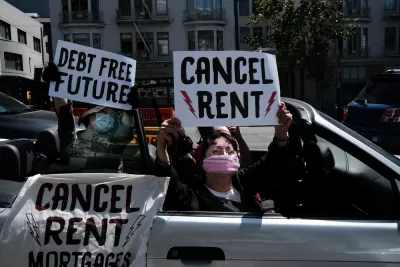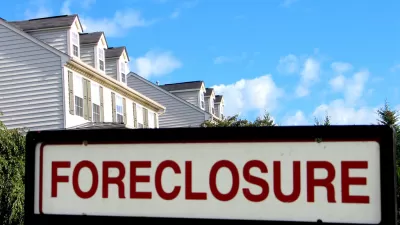Three big, but basic, things that we could do right now to get us much closer to equity in housing.

America’s housing system was never just built to create housing. It was designed to maintain racially and economically segregated neighborhoods and it rests on a long legacy of inequity, specifically anti-Black racism. In this sense, our housing system isn’t really broken. Its weakness in this moment—in the pandemic—just shows that it’s working as designed. COVID-19 is holding up the mirror, and we have an unprecedented opportunity to begin the uncomfortable process of examining, owning, dismantling, and rebuilding the inequitable system that got us here.
Through decades of housing policies and practices that have literally divided us—such as redlining and the Federal Housing Administration’s 1938 Underwriting Manual, which allowed loan denial based on race—we’ve intentionally created entire communities that are more vulnerable to crisis than others. Black Americans are still the least likely group to own homes and build generational wealth, and therefore have fewer economic protections (the homeownership gap is actually wider today than it was in the 1960s when housing discrimination was overtly legal). People of color are still overrepresented in our homeless populations and our incarcerated populations, and those most impacted by the lack of affordable housing, jobs, and quality healthcare.
When you look at where and who this pandemic is hitting hardest, it’s clear that race, place, job type, and income matter. It’s hard not to see housing—and its long threadline through history—as inextricably linked to this moment.
Housing policy helped get us here, and now housing may be another collateral consequence of the pandemic and its economic fallout. While December’s COVID relief bill provides some relief for renters and short-term protection from eviction, it does little to address the long-standing inequalities that got us here. It’s a temporary bandage. We need to leverage these short-term legislative wins as a jumping-off point to transform our housing system as a whole.
This moment now demands ...
FULL STORY: Moving from the Inequitable Housing System We Have to the Housing System We Need

Study: Maui’s Plan to Convert Vacation Rentals to Long-Term Housing Could Cause Nearly $1 Billion Economic Loss
The plan would reduce visitor accommodation by 25,% resulting in 1,900 jobs lost.

North Texas Transit Leaders Tout Benefits of TOD for Growing Region
At a summit focused on transit-oriented development, policymakers discussed how North Texas’ expanded light rail system can serve as a tool for economic growth.

Why Should We Subsidize Public Transportation?
Many public transit agencies face financial stress due to rising costs, declining fare revenue, and declining subsidies. Transit advocates must provide a strong business case for increasing public transit funding.

How to Make US Trains Faster
Changes to boarding platforms and a switch to electric trains could improve U.S. passenger rail service without the added cost of high-speed rail.

Columbia’s Revitalized ‘Loop’ Is a Hub for Local Entrepreneurs
A focus on small businesses is helping a commercial corridor in Columbia, Missouri thrive.

Invasive Insect Threatens Minnesota’s Ash Forests
The Emerald Ash Borer is a rapidly spreading invasive pest threatening Minnesota’s ash trees, and homeowners are encouraged to plant diverse replacement species, avoid moving ash firewood, and monitor for signs of infestation.
Urban Design for Planners 1: Software Tools
This six-course series explores essential urban design concepts using open source software and equips planners with the tools they need to participate fully in the urban design process.
Planning for Universal Design
Learn the tools for implementing Universal Design in planning regulations.
City of Santa Clarita
Ascent Environmental
Institute for Housing and Urban Development Studies (IHS)
City of Grandview
Harvard GSD Executive Education
Toledo-Lucas County Plan Commissions
Salt Lake City
NYU Wagner Graduate School of Public Service





























